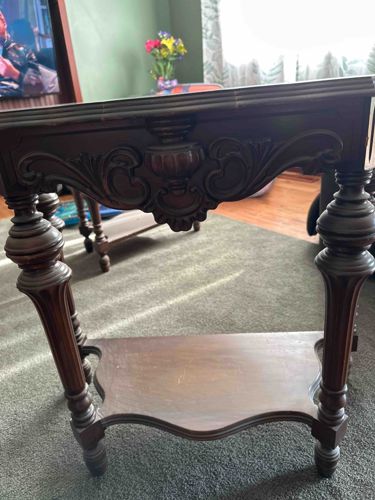
Victorian Style Carved Wood End Table
This is a rectangular end table, likely constructed from a dark-stained hardwood such as mahogany or walnut, exhibiting characteristics of Victorian or early 20th-century revival styles. The table features a flat top surface, directly beneath which is a frieze adorned with intricate carving. The most prominent decorative element is a central urn or vase-like motif, flanked by flowing acanthus scrolls or volutes, suggesting classical influences. This carved apron spans the longer sides of the table. The table is supported by four robust, heavily turned legs. Each leg displays multiple bulbous and reeded sections, tapering towards the bottom. Halfway down the legs, there is a lower shelf with a serpentine or ogee-curved edge, connecting the legs and providing additional surface area. The overall color is a deep reddish-brown, indicative of a dark stain and an aged patina. Visible condition issues include some scuffs and scratches on the lower shelf, consistent with age and use. The finish on the top surface also appears to have areas of wear or dullness. There are no readily apparent maker's marks or signatures from the visible angles. The craftsmanship appears solid, with attention paid to the turned details and carving, which seems to be a combination of hand and machine work, common for furniture from the late 19th to early 20th century. The ornate carving and substantial turned legs indicate a piece designed for a formal or traditional setting.
AI-Generated Appraisal Disclaimer
Estimated Value
$350-550
Basic Information
Category
Furniture
Appraised On
January 29, 2026
Estimated Value
$350-550
Additional Details Provided By Owner
User Provided Information
Antique table
Item Description
This is a rectangular end table, likely constructed from a dark-stained hardwood such as mahogany or walnut, exhibiting characteristics of Victorian or early 20th-century revival styles. The table features a flat top surface, directly beneath which is a frieze adorned with intricate carving. The most prominent decorative element is a central urn or vase-like motif, flanked by flowing acanthus scrolls or volutes, suggesting classical influences. This carved apron spans the longer sides of the table. The table is supported by four robust, heavily turned legs. Each leg displays multiple bulbous and reeded sections, tapering towards the bottom. Halfway down the legs, there is a lower shelf with a serpentine or ogee-curved edge, connecting the legs and providing additional surface area. The overall color is a deep reddish-brown, indicative of a dark stain and an aged patina. Visible condition issues include some scuffs and scratches on the lower shelf, consistent with age and use. The finish on the top surface also appears to have areas of wear or dullness. There are no readily apparent maker's marks or signatures from the visible angles. The craftsmanship appears solid, with attention paid to the turned details and carving, which seems to be a combination of hand and machine work, common for furniture from the late 19th to early 20th century. The ornate carving and substantial turned legs indicate a piece designed for a formal or traditional setting.
Related Tags
Get Your Items Appraised
Instant estimates of your treasures with AI-powered instant appraisals